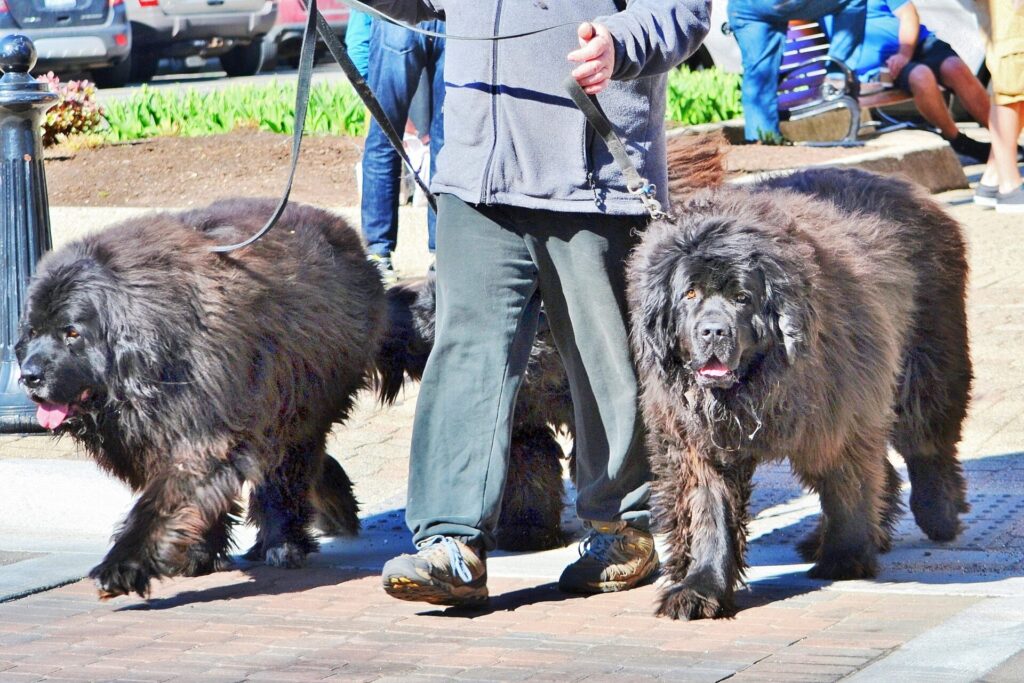Introduction
Newfoundland dogs, also known as Newfies, are a large and affectionate breed that are known for their sweet and gentle nature. These dogs were originally bred as working dogs in Newfoundland, Canada, and have since become popular family pets all over the world. In this guide, we will discuss everything you need to know about Newfoundland dogs, including their history, appearance, personality, health, and care.
Table of Contents
Newfoundland dogs Breed Overview
| Attribute | Description |
| Origin and History | Newfoundland dogs were originally bred as working dogs in Newfoundland, Canada. They were used by fishermen to pull nets and carts and to rescue people from the water. The breed was later imported to England where it became popular with the nobility. Today, Newfoundland dogs are beloved family pets and working dogs around the world. |
| Affectionate with Family | Very affectionate and loyal towards their families. |
| Good with children | Known for their gentle nature and excellent with kids. |
| Good with other dogs | Generally friendly and get along well with other dogs. |
| Ideal family | Families with large yards or access to open spaces. |
| Space requirements | They need a decent amount of space to move around. |
| Shedding level | Newfoundland dogs shed heavily, especially twice a year. |
| Grooming frequency | Daily brushing is recommended to prevent matting. |
| Coat type | Thick, double coat that provides insulation. |
| Coat length | Long, dense and water-resistant. |
| Drooling level | High drooling level due to their large size. |
| Openness to strangers | Generally friendly and not aggressive towards strangers. |
| Playfulness | Affectionate and playful, especially in water. |
| Type of dog | Not typically used as a watch dog or guard dog. |
| Trainability | Highly trainable with positive reinforcement methods. |
| Energy level | Moderate to high energy level that requires daily exercise. |
| Barking level | Moderate barking level, mainly when bored or lonely. |
| Mental stimulation needs | High mental stimulation needs due to their intelligence. |
| Dietary requirements | High-quality, well-balanced diet with enough protein. |
History and Origins
Newfoundland dogs have a long and fascinating history. They were originally bred in Newfoundland, Canada in the 18th century as working dogs for fishermen. They were trained to help fishermen retrieve nets and haul in heavy loads of fish. Their large size, webbed feet, and thick, waterproof coat made them perfectly suited for this work.
As the fishing industry declined in Newfoundland, the popularity of Newfoundland dogs as working dogs also declined. However, the breed was saved from extinction by a group of dog enthusiasts who recognized their value as family pets. Today, Newfoundland dogs are popular family pets all over the world.
Appearance and Size

Newfoundland dogs are a large and imposing breed, with males typically weighing between 130 and 150 pounds and standing 28 inches tall at the shoulder. Females are slightly smaller, weighing between 100 and 120 pounds and standing 26 inches tall at the shoulder.
Newfoundlands have a distinctive appearance, with a large head, droopy jowls, and a thick, waterproof coat. Their coat can be black, brown, gray, or white and black, and is made up of a dense undercoat and longer, coarser outer hairs. Their webbed feet make them excellent swimmers.
Personality and Temperament
Newfoundland dogs are known for their sweet and gentle nature. They are incredibly loyal to their families and are great with children. They are also very intelligent and trainable, and make excellent therapy dogs.
Newfoundlands are known for their calm and patient temperament, which makes them great with children and other animals. They are also known for their love of water, and many Newfoundlands are excellent swimmers.
Health and Care
Newfoundland dogs are generally healthy, but like all breeds, they are prone to certain health issues. These can include hip and elbow dysplasia, bloat, heart problems, and eye problems. Regular checkups with a veterinarian are important to catch any potential health issues early.
Newfoundlands require regular grooming to keep their thick coat in good condition. They should be brushed at least once a week, and more frequently during shedding season. They also require regular exercise, including daily walks and plenty of opportunities to swim.
Training and Exercise
Newfoundland dogs are highly trainable, but they do require consistent and patient training. Positive reinforcement methods work best with this breed, as they respond well to praise and rewards. Socialization is also important, as Newfoundlands can be wary of strangers if not properly socialized.
Newfoundlands require regular exercise, including daily walks and plenty of opportunities to swim. They are also great candidates for activities like obedience training, agility, and therapy work.
Feeding and Nutrition
Newfoundland dogs require a high-quality, well-balanced diet that is appropriate for their size and activity level. It is important to feed them a diet that is rich in protein, as this will help them to maintain strong muscles and a healthy coat. It is also important to avoid overfeeding, as Newfoundlands can be prone to weight gain.
Grooming and Maintenance
Newfoundland dogs require regular grooming and maintenance to keep them looking and feeling their best. This includes regular brushing, trimming of their nails, and cleaning of their ears. They also require regular dental care, including brushing their teeth and providing them with chew toys to help keep their teeth clean.
Pros of owning a Newfoundland dog:
- Affectionate and loving towards their family
- Great with children and other pets
- Excellent swimmers and enjoy water activities
- Good watchdogs, protective but not aggressive
- Intelligent and trainable
- Calm and gentle temperament
- Heavy shedding can be managed with regular grooming
- Big and impressive appearance can deter potential intruders
- Loyal and devoted companions
- Can be a therapeutic presence, providing comfort and support
Cons of owning a Newfoundland dog:
- Large size requires ample space and strong handling
- High grooming needs to maintain their thick coat
- Heavy shedding can be a challenge for those with allergies or sensitivities
- Can be prone to health issues such as hip dysplasia and heart conditions
- Require regular exercise to prevent obesity and maintain good health
- Can drool excessively, causing mess and potential hygiene issues
- Can be stubborn and require consistent training and socialization
- May not be suitable for hot climates due to their thick coat
- May be expensive to purchase from a reputable breeder
- Shorter lifespan compared to some smaller breeds.
Living with a Newfoundland Dog
Newfoundland dogs make wonderful family pets, but they do require a certain amount of space and exercise. They are well-suited to homes with large yards or access to open spaces, and they require plenty of opportunities to swim and play. They are also excellent with children and make great companions for families.
Choosing a Newfoundland Dog
When choosing a Newfoundland dog, it is important to do your research and find a reputable breeder. Look for a breeder who is knowledgeable about the breed and who raises their dogs in a clean and healthy environment. It is also important to consider the temperament and personality of the dog, as well as their health and pedigree.
Conclusion
In conclusion, Newfoundland dogs are a unique and beloved breed with many wonderful qualities. They are known for their gentle nature, loyalty, and intelligence, and make wonderful companions for families and individuals alike. While they do require a certain amount of maintenance and exercise, the love and companionship they offer is well worth the effort. With proper care and training, Newfoundland dogs can thrive and provide their owners with many years of joy and companionship.
please also check out other articles on this website Top 10 Rare Dog Breeds: The Hidden Gems of the Canine World, 15 Most Expensive Dog Breeds: A Comprehensive Guide
FAQs
Are Newfoundland dogs good with children?
Yes, Newfoundland dogs are known for their sweet and gentle nature and are excellent with children.
How much exercise do Newfoundland dogs require?
Newfoundland dogs require regular exercise, including daily walks and plenty of opportunities to swim.
Do Newfoundland dogs shed a lot?
Yes, Newfoundland dogs have a thick, double coat and shed regularly. Regular brushing can help to minimize shedding.
Are Newfoundland dogs easy to train?
Yes, Newfoundland dogs are highly trainable and respond well to positive reinforcement methods.
Are Newfoundland dogs good watchdogs?
No, Newfoundland dogs are not typically good watchdogs as they are generally friendly with strangers.
Do Newfoundland dogs have any health issues?
Like all breeds, Newfoundland dogs can be prone to certain health issues, including hip and elbow dysplasia, bloat, heart problems, and eye problems.
How long do Newfoundland dogs live?
Newfoundland dogs typically live between 8 and 10 years.
Are Newfoundland dogs good swimmers?
Yes, Newfoundland dogs are excellent swimmers and were originally bred as working dogs for fishermen.
Do Newfoundland dogs get along with other animals?
Yes, Newfoundland dogs are generally friendly with other animals if they are properly socialized.
Are Newfoundland dogs good therapy dogs?
Yes, Newfoundland dogs make excellent therapy dogs due to their calm and patient nature.
Is Newfoundland a good family dog?
Yes, Newfoundland dogs are known for their affectionate and gentle nature, making them great family dogs.
Are Newfoundland dogs high maintenance?
Yes, Newfoundland dogs require a lot of grooming and exercise, and their large size can make them high maintenance.
How much is a Newfoundland dog UK?
The price of a Newfoundland dog in the UK can vary, but typically ranges from £1,500 to £3,000 or more.
Are Newfoundland dogs gentle?
Yes, Newfoundland dogs are typically gentle and loving towards their family members and children.
Newfoundland dog size?
Newfoundland dogs are a large breed, typically weighing between 100-150 pounds.
Newfoundland dog height?
Newfoundland dogs are a tall breed, typically standing between 26-28 inches at the shoulder.
Are Newfoundland dogs gentle?
Yes, Newfoundland dogs are generally known for their gentle and affectionate temperament.
Are Newfoundlands bigger than Great Danes?
Yes, Newfoundland dogs are typically larger than Great Danes.
Will Newfoundlands protect you?
While Newfoundland dogs can be protective, they are generally not considered guard dogs and may not always actively protect their owners.
Why not to get a Newfoundland dog?
Newfoundland dogs require a lot of exercise, grooming, and space, so they may not be the best fit for everyone’s lifestyle and home.
Do Newfoundlands like cuddling?
Yes, Newfoundland dogs are known to enjoy cuddling with their owners.
Can Newfoundlands be left alone?
Newfoundland dogs do not like being left alone for long periods of time and may become destructive if left alone too often.
Are Newfoundland difficult?
Newfoundland dogs can be challenging to train due to their stubbornness and independent nature.
Do Newfoundland dogs shed a lot?
Yes, Newfoundland dogs shed a lot and require regular grooming to manage their coat.
Do Newfoundland dogs need a big house?
Newfoundland dogs can adapt to living in smaller spaces as long as they get enough exercise and mental stimulation.
Why are Newfoundland dogs so nice?
Newfoundland dogs are known for their friendly and affectionate nature, making them a popular breed for families.
How long does a Newfoundland live?
The average lifespan of a Newfoundland dog is around 8-10 years.
Are Newfoundlands barkers?
Newfoundland dogs are generally not excessive barkers, but may bark to alert their owners.
How intelligent are Newfoundland dogs?
Newfoundland dogs are intelligent and eager to please, making them relatively easy to train.
What are the pros and cons of owning a Newfoundland?
The pros of owning a Newfoundland include their loving and gentle nature, while the cons include their high maintenance needs and large size.
Is a Newfoundland a mastiff?
No, a Newfoundland is not a type of mastiff.
Do Newfoundlands like swimming?
Yes, Newfoundland dogs are typically strong swimmers and enjoy being in the water.
Are Newfoundlands bigger than Great Pyrenees?
Newfoundland dogs are similar in size to Great Pyrenees, but may be slightly larger.
References
- The American Kennel Club (AKC) – https://www.akc.org/
- The Canadian Kennel Club (CKC) – https://www.ckc.ca/
- The Kennel Club (UK) – https://www.thekennelclub.org.uk/
- The Fédération Cynologique Internationale (FCI) – https://www.fci.be/
- The Newfoundland Club of America (NCA) – https://www.ncanewfs.org/
- The Newfoundland Dog Club (UK) – http://www.thenewfoundlandclub.co.uk/
- The Newfoundland and Labrador Dog Club of Canada – https://www.nldogclub.com/




[…] The Essential Guide to Newfoundland Dogs 2023 […]
[…] The Essential Guide to Newfoundland Dogs 2023 […]
[…] period, it’s crucial to ensure they are well-prepared to handle the time alone. Here are some essential cat care tips and pet care advice to help you get your furry friend […]
[…] monitoring and follow-up care are essential for maintaining the effectiveness of treatment and addressing any secondary […]
[…] origins of this behavior to learning how to redirect it, we will provide you with valuable pet care tips to better understand your furry […]
[…] The Essential Guide to Newfoundland Dogs 2023 […]
[…] the year. It is essential for cat owners to be aware of these seasonal variations and adjust their pet care […]
[…] keep your Oriental Shorthair cat happy and healthy, it is essential to provide them with proper care and attention. Here are some important tips to ensure the well-being of your feline […]
[…] cats also have risks like hyperthyroidism and breathing issues. Good breeding and early veterinary care are very important. They help prevent many health problems. This makes sure that munchkin cats stay […]